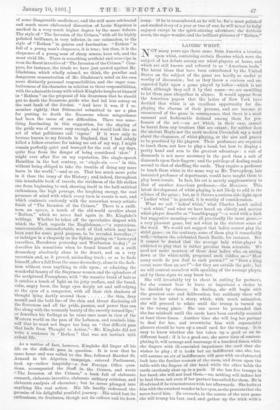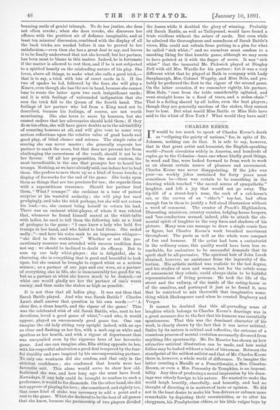LADIES' WHIST.
OT many years ago there came from America a treatise upon whist, containing certain theories which were the subject of hot debate among our whist-players at home, and which are still known and referred to as "American leads." The latest ideas that have been contributed by the United States on the subject of the game are hardly so useful or worthy of discussion ; but as they throw a curious and un- expected light upon a game played by ladies—which is not whist, although they call it by that name—we are unwilling to let them pass altogether in silence. It would appear from the American papers that the ladies of New York have decided that whist is an excellent opportunity for dis- playing the charms of their persons, and are become so enamoured of the game in consequence, that there is a most unusual and fashionable demand among them for pro- fessors of the art :—an art which, in their case, cannot be learnt from any treatises that are extant; for neither does the ancient Hoyle nor the more modern Cavendish say a word about the elegances of whist-playing, or the airs and graces to be practised by the players. Their professors are required to teach them, not how to play a hand, but how to display a pretty hand and arm to the greatest advantage : a suit of diamonds is not more necessary in the pack than a suit of diamonds upon their fingers ; and the privilege of dealing ranks second to that of shuffling the cards. They require a professor to teach them whist in the same way as. Mr. Turveydrop, late lamented professor of deportment, would have taught them to play lawn-tennis. In fact, his art is merely supplementary to that of another American professor,—the Manicure. This latest development of whist-playing is not likely to add to the science of the game ; but, as it throws a curious side-light upon " Ladies' whist" in general, it is worthy of consideration.
What we call " ladies' whist," what Charles Lamb called "sick whist," and what we have heard an elderly and morose whist-player describe as "bumblepuppy "—a word with a dark but suggestive meaning—are all practically the same game,— a very pleasant game, but not whist in the strictest sense of the word. We would not suggest that ladies cannot play the strict game; on the contrary, some of them play it remarkably well, witness the celebrated Sarah Battle, for instance. But it cannot be denied that the average lady whist-player is addicted to play that is rather peculiar than scientific. We need not make mention of those dear ladies who, on sitting down at the whist-table, propound such riddles as—" How many cards do you deal to each person ?" or "Does a king count more than an ace P"—for they are outside the pale ; but we will content ourselves with speaking of the average player, and by these signs we may know her.
She will invariably try to cheat in cutting for partners, for she cannot bear to leave so important a choice to be decided by chance. In dealing, she will begin with the greatest care and deliberation, but suddenly there will occur to her mind a story, which, with much animation, she will proceed to relate until the trump is turned up in the wrong place. She can never be persuaded that she has misdealt until the cards have been carefully counted at least three times. Another time she will beg her partner to deal for her, and overwhelm him with reproachful glances should he turn up a small card for the trump. It is easy to know whether she has taken up a good or an in- different hand : if it be a good ono, she never tires of content- plating it, will arrange and rearrange it a hundred times, while she fingers with ill-concealed impatience the card that she wishes to play ; if it looks but an indifferent one, she, too, will assume an air of indifference, will gaze with an abstracted look into the further corners of the room, and drum upon the table with the fingers of one hand while the other holds the cards carelessly shut up in a pack. If she has five trumps in her hand, she will not lead them,—no, nothing will induce her to lead them, not even if her partner has called for them. He is ill-advised if he remonstrates with her afterwards. She looks at him with the sweetest wonder in her eyes, as she protests that she never heard him. En revanche, in the course of the next game she will trump his best card, and gather up the trick with a beaming smile of genial triumph. To do her justice, she does not often revoke ; when she does revoke, she discovers her offence with the prettiest air of defiance imaginable, and at least ten minutes' discussion, combined with the display of all the back tricks, are needed before it can be proved to her satisfaction,—even then she has a great deal to say, and leaves it to be finally understood that not she herself, but her partner, has been most to blame in this matter. Indeed, he is fortunate if the matter is allowed to rest then, and if he is not subjected to a spirited homily on the misleading nature of his play. She loves, above all things, to make what she calls a good trick,— that is to say, a trick with lots of court cards in it. If the two of spades be led, followed by the four, she will play a Knave, even though she has the ace in hand, because she cannot bear to waste the latter upon two such insignificant cards ; and it is with feelings of unbounded indignation that she sees the trick fall to the Queen of the fourth hand. The feelings of her partner who led from a King need not be described, because his feelings, of course, are not worth mentioning. She also loves to score by honours, but she cannot endure that her adversaries should hold them ; if they do so too often, she will have grave doubts as to the advisability of counting honours at all, and will give vent to some very serious reflections upon the relative value of good hands and good play, of blind chance and science. The simple rules of scoring she can never master ; she generally requests her partner to mark the score, but that does not prevent her from challenging the correctness of the result, should it not be in her favour. Of all her propensities, the most curious, the most ineradicable, is the one that prompts her to hoard her trumps. Nothing, as we have already said, can induce her to lead them. She prefers to save them up as a kind of bonne bouche, a display of fireworks for the end of the game. She looks upon them as things that are too precious for use; she regards them with a superstitious reverence. Should her partner lead them, " What P trumps !" she exclaims in a tone of pained surprise at his wasteful audacity ; she will play her card grudgingly, and take the trick perhaps, but she will not return his lead,—no, she cannot bring herself to return his lead. There was an eminent whist-player., of whom it was related that, whenever he found himself seated at the whist-table with ladies, he used to tell them the following tale as a kind of prologue to the game : " I once knew a lady who held five trumps in her hand, and who failed to lead them. She ended sadly ;"—and here his voice sank to an impressive whisper- " she died in the workhouse." Whether or not this pre- cautionary measure was attended with success tradition does not say : we should be inclined to doubt its efficacy. But to sum up our lady whist-player : she is delightful, she is charming, she is everything that is good and beautiful to look upon, but she cannot be brought to regard whist as a serious science ; as a partner of our joys and our woes, as a partner of everything else in life, she is immeasurably too good for us, but as a partner at whist she leaves much to be desired,—at whist one would gladly see her the partner of one's worst enemy, and then make the stakes as high as possible.
It is not thus that all ladies play. It was not thus that Sarah Battle played. And who was Sarah Battle P Charles Lamb shall answer that question in his own words :—" A clear fire, a clean hearth, and the rigour of the game.' This was the celebrated wish of old Sarah Battle, who, next to her .devotions, loved a good game of whist,"—and who, it would appear, played an uncommonly good game too. One can imagine the old lady sitting very upright indeed, with an eye as clear and flashing as her fire, with a mob-cap as white and spotless as her hearth, and with a rigour of deportment that was unequalled even by the rigorous laws of her favourite game. And one can imagine, also, Elia, sitting opposite to her, with his respectful admiration a good deal tempered by the fear- ful timidity and awe inspired by his uncompromising partner. To only one weakness did she confess, and that only in the strictest, confidence ; she confessed that hearts were her favourite suit. This alone would serve to show how old- fashioned she was, and how long ago she must have lived. Nowadays, if any lady could be brought to confess to such a preference, it would be for diamonds. On the other hand, she did not approve of playing for love ; she considered, and rightly too, that some kind of stake was necessary to add a point and a zest to the game. Whist she declared to be the best of all games that she knew, because the partnership of two players divided the losses while it doubled the glory of winning. Probably old Sarah Battle, as well as Talleyrand, would have found a frisk vieillesse without the solace of cards. But even while he admired the thoroughness and soundness of Sarah Battle's views, Elia could not refrain from putting in a plea for what he called "sick whist;" and we ourselves must confess to a sneaking liking for that humble game, although we may seem to have pointed at it with the finger of scorn. It was " sick whist" that the immortal Mr. Pickwick played at Dingley Dell with old Mrs. Wardle for his partner; but it was a very different whist that he played at Bath in company with Lady Snuphanuph, Mrs. Colonel Wugsby, and Miss Bolo, and pro- bably be preferred the first to the rigour of the second game. On the latter occasion, if we remember rightly, his partner, Miss Bolo, " rose from the table considerably agitated, and went straight home in a flood of tears, and a sedan-chair." That is a failing shared by all ladies, even the bept players ; though they are generally careless of the stakes, they cannot bear to lose. But what would Miss Battle or Miss Bolo have said to the whist of New York P What would they have said !

































 Previous page
Previous page